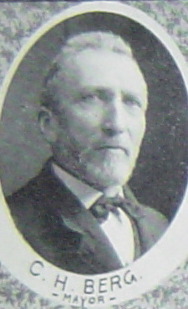Encyclopedia Dubuque
"Encyclopedia Dubuque is the online authority for all things Dubuque, written by the people who know the city best.”
Marshall Cohen—researcher and producer, CNN
Affiliated with the Local History Network of the State Historical Society of Iowa, and the Iowa Museum Association.
BERG, Christopher H.
BERG, Christopher H. (Pittsburgh, PA, Mar. 15, 1841-Dubuque, IA, Apr. 9, 1926). MAYOR. Berg served as the mayor of Dubuque from 1898 to 1906 after one term as an alderman. He welcomed presidents William McKinley and Theodore Roosevelt to the city and presided over the community during the worst street car strike in Dubuque's history. State troopers and Pinkerton detectives were called to reestablish order.
One of the issues Berg dealt with as mayor was icy SIDEWALKS. In 1903 he made good on his threat to fence in sidewalks from which the snow had not been removed. Finding sidewalks on Main Street not clean of snow, he ordered the Sidewalk Inspector to "fence" the area off using saw horses and planks. Fortunately for the merchants involved, the city owned only four saw horses.
As embarrassed shop owners cleared their walks so customers could enter their shops, the planks and saw horses were moved to other needy locations. Rather than continue the practice, the city authorities decided to fine any property owners who did not clear their sidewalks within twenty-four hours. The fine would not be less than two dollars or more than ten dollars.
After the CIVIL WAR, Berg was foreman of the Dubuque Times office for two years.
Berg was instrumental in organizing the firm of Palmer, Winall, Bott and Berg Printing Company. In the early 1900s, he purchased the interests of his partners and organized Berg and Briggs, one of the largest printing companies in Dubuque. He was also a director of the GERMAN TRUST AND SAVINGS BANK, vice president of Dubuque National Bank, and president of the BERG-ARDUSER COMPANY.
---
Source:
Oldt, Franklin T., History of Dubuque County Iowa. Chicago: Goodspeed Historical Association, 1880, p. 704


